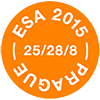RN Coordinator:
Prof.Dr. Dan Eugen Ratiu, Babes-Bolyai University, Cluj-Napoca, Romania
daneugen.ratiu(at)gmail.com
Sacha Kagan, Leuphana University Lueneburg, Germany
kagan(at)uni.leuphana.de
|
The European Sociological Association will hold its next conference from 25 to 28 August 2015 in Prague, Czech Republic. The general theme of the 12th conference of ESA is Differences, Inequalities and the Sociological Imagination. With these keywords one may associate the questions of how do the arts play in the acceleration of global processes of social and cultural change, and how sociology of the arts does confront this challenge. Art’s position within society and politics has always been complex and ambivalent. Artists may raise a critical voice or offer ideological legitimation for a dominant, hegemonic image of society. The attitude of the arts towards contemporary major issues – such as the increase in social inequalities engendered by economic crisis, the ensuing threats to democracy and justice, the forms of domination and the multiple expressions of difference and integration today – has never lost its relevance. Therefore, we would like to invite papers on this theme and to create special sessions with the expectation that they may include a broad nexus of sub-issues around the relation and commitment of arts in society as well as the ways for sociological imagination to renew the theoretical and empirical exploration of the intricate interweaving of social, economic and political dynamics contained in these processes of change. The ESA-conference has always been open to other themes that are not related to the main theme. This openness to all areas of the sociology of the arts is highly valued since the Research Network aims to bring together researchers and supporting interchange and mutual learning. For this reason, we invite experienced and young scholars from various disciplines sensitive to social inquiries into the arts to also submit papers with a different thematic focus: 01RN02 - Developments in particular domains in arts, including architecture, urban planning, applied arts, arts within the domain of popular culture (e.g. film, television, and popular music) as well as traditional 'high' arts (e.g. music, visual arts, literature, theatre, etc.). 02RN02 - The process of production, distribution, promotion and commercialisation of works of art, including artistic practices, the impact of technology, new means of production, forms of collaboration, the formation of art theory, the development of arts markets, the process of valuation, etc. 03RN02 - The process of presentation and mediation of arts, including art criticism and publicity in all domains of the arts, museums, theatres, concerts, audience studies, attitudes towards the audience, educational programs, etc. 04RN02 - Professional development, including amateurs and semi-amateurs, vocational education, art schools, professional differentiation, artistic income, artistic reputation, etc. 05RN02 - Arts organisations (not only museums and theatres, but also festivals and artists’ unions) – investigation of historical development, power relations, effects, managerial processes, program selection, processes within the organisations such as gate-keeping, leadership, etc. 06RN02 - Arts policy (especially the sociological aspects thereof), including legal issues, public and private funding, public discourse and debates (e.g. classification of art, arts and religious symbols, arts and sexuality, arts and racism), censorship, analysis of the impact of arts, sustainability, lobbying associations, cultural ministries or other government bodies. 07RN02 - Social and cognitive effects of the arts, including arts and identity formation, arts and bodies, aesthetic experience, arts and ethics, coding and decoding, gender related practices, ethnographic aspects, art for social transformation, arts in communities, and arts as a part of urban culture. 08RN02 - Arts from a macro-sociological perspective, including (de-) institutionalisation, economisation, globalisation vs. localism, digitalisation, mediamorphosis, arts and social cohesion, arts and ethics, arts and hegemony and arts and power. 09RN02 - Theoretical development in arts sociology, such as the production of culture approach, (post-) structuralism, field theory, system theory, praxeology as well as methodological issues. 10RN02 – Arts and everyday life, including relations between art worlds and day-to-day worlds, the experiential and the sensory, embodied and mediated elements of practice and places, the social and cultural significance of the senses, the aesthetics of everyday life, and sociological or interdisciplinary approaches to the everyday and to daily and organisational life. 11RN02 – Sociology of the Arts (open): papers that do not fit into one of the suggested sessions above should be submitted to this open session. Papers and sessions will be rearranged when necessary after submission of abstracts and evaluation. |
|
Notes for authors Authors are invited to submit their abstract either to the general session or any specific session. Please submit only to one session. After abstract evaluation, coordinators will have the chance to transfer papers between sessions where applicable. Abstracts should not exceed 250 words. Each paper session will have the duration of 1.5 hours. Normally sessions will include 4 papers. Abstracts must be submitted online to the submission platform, see below. Abstracts sent by email cannot be accepted. Abstracts will be peer-reviewed and selected for presentation by the Research Network; the letter of notification will be sent by the conference software system in early April 2015. Abstract submission deadline (extended): 15th February 2015 Abstract submission platform: www.esa12thconference.eu
If you have further questions on the conference, please visit the conference website. For further information on the Research Network, please visit www.europeansociology.org. |






